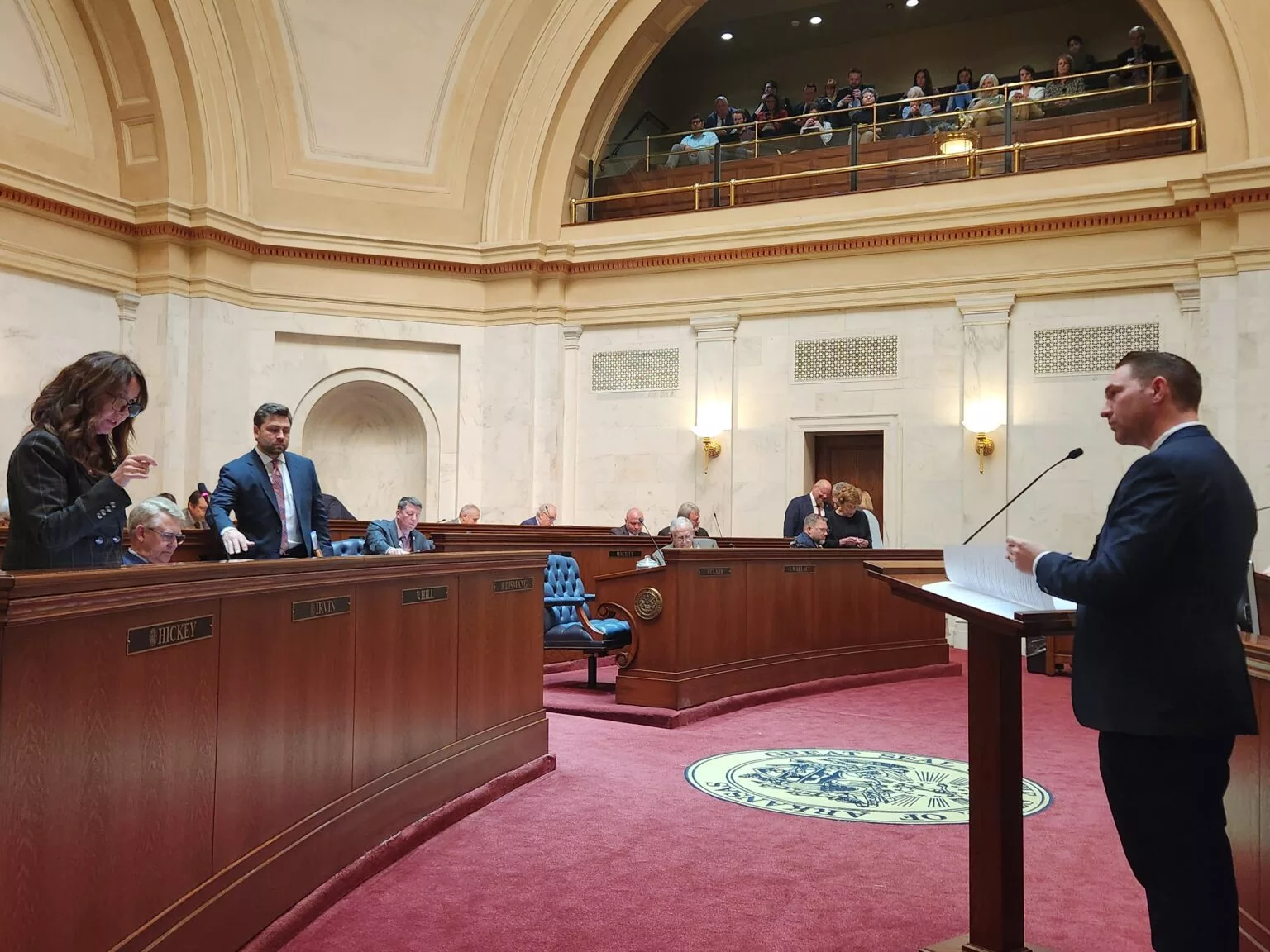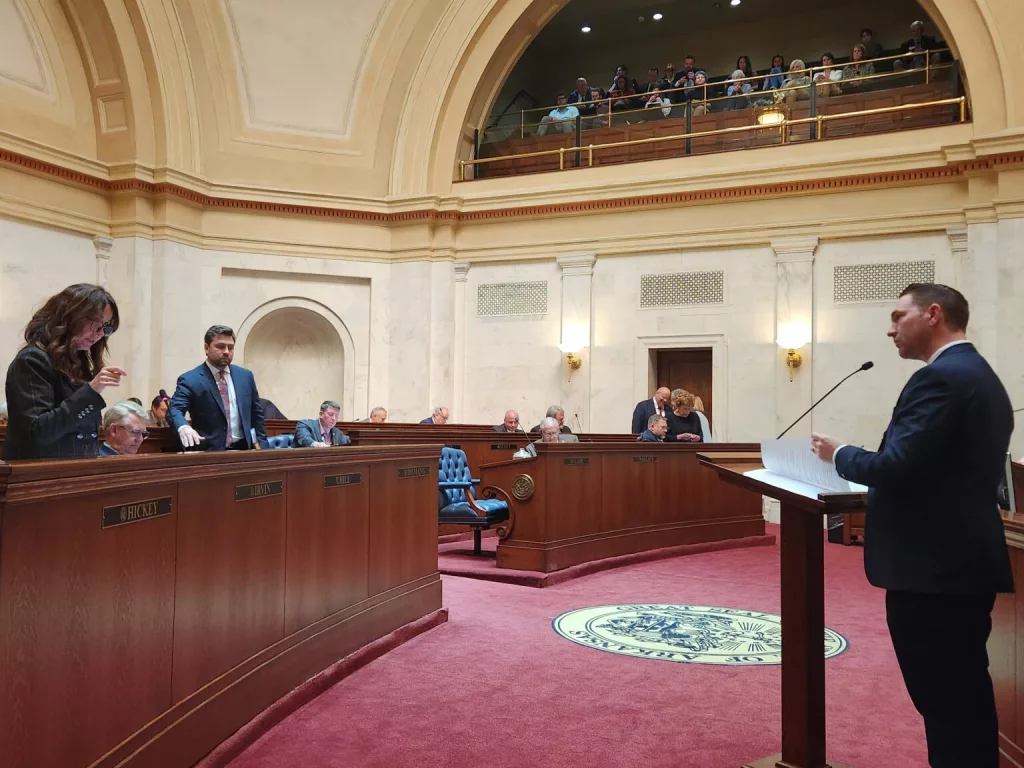
Above: Sen. Missy Irvin (left), R-Mountain View, asks a question about Senate Bill 611, sponsored by Sen. Tyler Dees (right), R-Siloam Springs, on the Senate floor on Monday, April 7, 2025. (Tess Vrbin/Arkansas Advocate)
Committee approves separate bill to give parents the right to sue social media platforms over harm to their children
By Tess Vrbin, Arkansas Advocate
The Arkansas House will consider a proposed amendment to the state’s enjoined social media age verification law after the legislation received Senate approval Monday.
Additionally, the Senate will vote Tuesday on a bill that would create a right for parents to sue social media platforms if their child develops eating disorders, self-harms, commits or attempts suicide, or becomes addicted to the platform’s feeds because of content the child was exposed to.
Sen. Tyler Dees, R-Siloam Springs, and Rep. Jon Eubanks, R-Paris, introduced both bills last week.
Senate Bill 611 would amend Act 689 of 2023, the Social Media Safety Act, which was the first of its kind in the nation and required social media platforms to verify the age of new account holders in Arkansas. Those under 18 could only access sites with parental permission.
A federal judge temporarily blocked Act 689 in August 2023, before it went into effect, and permanently blocked the law March 31 for violating the First Amendment and the due process clause of the U.S. Constitution.
The amendments to Act 689 in SB 611 more clearly define social media and apply the definition to more platforms, lower the age of minor users from under 18 to under 16 years old, prohibit social media algorithms from targeting minors, and add a penalty for companies that do not comply.
“There still is reasonable age-verification language, but it puts more emphasis on the social media company to make sure that they are not preying on the youth,” Dees said.
SB 611 passed the Senate with a bipartisan 21 votes. Four senators voted present and seven did not vote. Sens. Ricky Hill, R-Cabot; Jim Dotson, R-Bentonville; and Stephanie Flowers, D-Pine Bluff, voted against the bill.
Hill expressed the same concerns he did in 2023 before he voted against Act 689.
“I know I’m not going to change any of y’all’s minds, but I do want you to think about the slippery slope we’re walking on,” Hill said. “…If you want to limit the freedom of speech, go ahead and continue to vote for this.”
Dees said SB 611 would not result in withholding content but instead would “protect our most vulnerable.”
“We’re trying to make sure that the profits of these social media companies don’t come before the protection of our children,” Dees said.
Gov. Sarah Huckabee Sanders made the Social Media Safety Act a priority during her first year in office. In January, she called on lawmakers to amend the law and to give parents the right to take legal action against technology companies if their children experience mental health crises, such as suicidal ideation, tied to social media consumption.
No members of the public spoke for or against Senate Bill 612, the private right of action bill, before the Senate Judiciary Committee, which passed the bill with no audible dissent Monday.
Under SB 612, a social media platform could be held accountable for “placing content on the feed, screen, account, or other digital medium of the minor that causes the minor to view the content without explicitly searching for that specific content and includes algorithmic promotion of the content based on a previous search or engagement” if viewing the content leads to “significant bodily or cognitive harm.”
Dees told both the committee and the full Senate that technology companies have contacted him asking for the bills to be amended so it would not be applicable to them. He said he is open to amending the bill but does not want to accommodate billion-dollar companies that have “neglected our youth.”
SB 611 and SB 612 both establish a civil penalty of $10,000 per violation. The penalty for violating the Social Media Safety Act was originally $2,500 per violation.
Sens. Clarke Tucker, D-Little Rock, and Gary Stubblefield, R-Branch, both asked Dees during the committee meeting how a plaintiff would prove under SB 612 that a social media platform “knowingly” caused intangible harm to a minor.
Whether a platform leads a minor to “develop or sustain an addiction” to it, as SB 612 states, is “a little tougher to prove” than a suicide attempt or an eating disorder “without getting inside someone’s head,” Tucker said.
Dees said SB 612 is “the framework to have that discussion” and creates a process for the courts to decide “if there’s damaging aspects that have taken place as a result of an interaction with Big Tech.”
Dees and Eubanks also sponsored the Bell to Bell, No Cell Act, which Sanders signed in February, that bans personal electronic devices, including cell phones and smart watches, in schools.
In March, a bipartisan majority of House members approved two bills that mimic stalled federal legislation aimed at regulating companies’ online interactions with children. Lead sponsor Rep. Zack Gramlich, R-Fort Smith, told the Advocate he does not expect to proceed with one of them, the Arkansas Kids Online Safety Act (KOSA).
The other bill is House Bill 1717, the Arkansas Children and Teens’ Online Privacy Protection Act. Gramlich said he is amending the bill and hopes to present it to the Senate Judiciary Committee on Wednesday.
HB 1717 would ban technology companies from collecting data from Arkansas minors except under specific circumstances, such as for financial transactions. They would also be barred from retaining that data and disclosing it to third parties that use the information in advertising targeted to children.
Editor’s Note: If you or someone you know needs help, the national suicide and crisis lifeline in the U.S. is available by calling or texting 988. There is also an online chat at 988lifeline.org.
The Arkansas Advocate is a nonprofit, nonpartisan news organization dedicated to tough, fair daily reporting and investigative journalism that holds public officials accountable and focuses on the relationship between the lives of Arkansans and public policy.
Have a news tip or event to promote? Email White River Now at news@whiterivernow.com. Be sure to like and follow us on Facebook and Twitter. And don’t forget to download the White River Now mobile app from the Google Play Store or the Apple App Store.
Get up-to-date local and regional news/weather from the First Community Bank Newsroom on Arkansas 103.3 KWOZ every weekday morning and afternoon. White River Now updates are also aired on weekday mornings on 93 KZLE, Outlaw 106.5, and Your FM 99.5. Catch CBS News around the top of every hour on 1340 KBTA.












